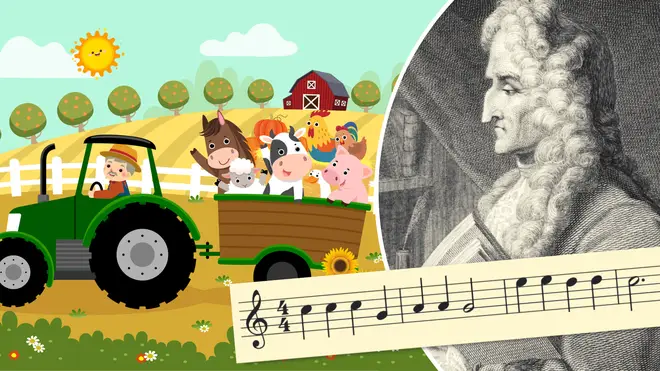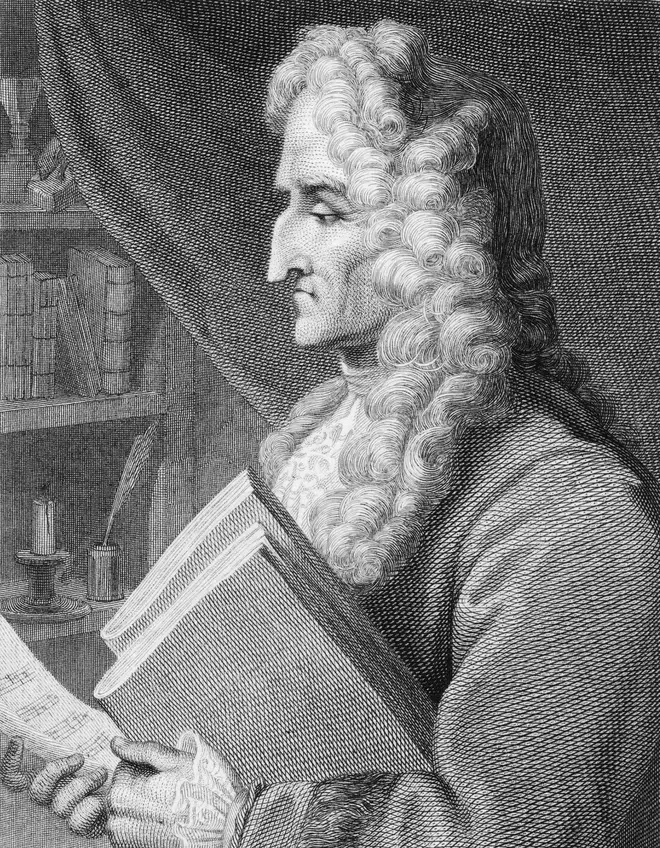On Air Now
Calm Classics with Ritula Shah 10pm - 1am
15 August 2023, 15:49 | Updated: 1 December 2023, 11:09

Old MacDonald Had a Farm is one of the most recognisable nursery rhymes in the world. But did you know the song may have been written for an 18th-century opera?
Arguably the world’s most famous fictional farmer, Old MacDonald and his team of farmyard animals are a staple of the childhood musical repertoire, with multiple translations of the song being taught across the globe.
With a catchy refrain of E-I-E-I-O, the lyrics to Old MacDonald Had a Farm help children learn animal noises and develop their understanding of phonics.
But did you know that the first version of Old MacDonald is thought to have originated in an 18th-century opera? Or that the lyrics originally described the cow as saying ‘boo’ instead of ‘moo’?
So come with us on a trip down to ye olde farm, and discover how an operatic work became the beloved nursery rhyme it is today...
Read more: ‘Old MacDonald Had a Farm’ reworked in the style of Beethoven is a stroke of genius

Old MacDonald in the Style of Beethoven
In 1706, an opera titled The Kingdom of the Birds (also known as Wonders of the Sun) was written by the English composer Thomas d’Urfey. Whilst the opera itself wasn’t a success, it did contain a rather familiar melody that we still hear today.
A song titled, In the Fields in Frost and Snows describes a farmer fondly describing his life living in the countryside, and the sound of his cows. It has a likeness to today’s Old MacDonald and shares not only similarities with the modern-day lyrics but also its melody. While not a replica, the tune could be described as a minor version of today’s beloved song. Listen to it below.
Experts are unsure whether the song was actually written by d'Urfey, with some thinking the melody was already a folk tune before the composer wrote it into his opera. However, after the early 1700s, all versions of In the Fields in Frost and Snows were credited to d'Urfey, and it became a popular country dance tune usually performed on the fiddle.
The work would go on to be published in the 1710 Second Volume of the Dancing Master and was later also included in the Second Book of the Compleat Country Dancing-Master first published in 1719.
Read more: Six of the biggest dance floor ‘drops’ in classical music history

In the Fields in Frost and Snow
One noticeable difference about In the Fields in Frost and Snows, is that the song began life without its famed titular farmer. Instead, the unnamed singer describes their experience living a “charming country life” in the first person.
In the original lyrics for In the Fields in Frost and Snows, the cows are also described to be booing rather than mooing, as in the 18th and 19th centuries, ‘boo’ was the written description of the low sound cattle made.
The first verse of d'Urfey’s comic song goes like this:
In the Fields in Frost and Snows,
Watching late and early;
There I keep my Father's Cows,
There I Milk 'em Yearly:
Booing here, Booing there,
Here a Boo, there a Boo, every where a Boo,
We defy all Care and Strife,
In a Charming Country-Life.
Read more: What are the origins of ‘Humpty Dumpty Sat on a Wall’, and what do the lyrics mean?

Almost 200 years after the publication of d'Urfey’s opera, a collection of World War 1 era songs was published by Lieutenant Frederick Thomas Nettleingham titled Tommy’s Tunes. The book released in 1917 contained lyrics more similar to our modern-day version, and they named a farmer. However, instead of MacDonald, the farmer’s name was, ‘Old Macdougal’.
The lyrics featured nine different types of farmyard animals, including chickens, ducks, geese, cows, sheep, cats, dogs, horses, and a donkey. It was also the first time the refrain-like lyric E-I-E-I-O was included in the song.
The first audio recordings thought to use the modern-day tune were made in the 1920s. In 1925, the Sam Patterson Trio recorded Old MacDonald Had a Farm on the Edison label, and two years later in 1927, the acclaimed Gid Tanner and His Skillet Lickers recorded their own version, again calling the farmer by his modern-day name.
Read more: What are the origins of ‘Jack and Jill’, and what do the lyrics mean?

Old MacDonald Had a Farm • Nursery Rhymes Song with Lyrics • Animated Cartoon for Kids
Present-day versions of the song have the flexibility for children to add their own dream farmyard animals to the mix. But by using the example of cows, chicks, pigs and a horse, the format of the internationally beloved song goes like this...
Old MacDonald had a farm
E-I-E-I-O
And on his farm he had some chicks
E-I-E-I-O
With a cluck-cluck here
And a cluck-cluck there
Here a cluck, there a cluck
Everywhere a cluck-cluck
Old MacDonald had a farm
E-I-E-I-O
Old MacDonald had a farm
E-I-E-I-O
And on his farm he had some cows
E-I-E-I-O
With a moo-moo here
And a moo-moo there
Here a moo, there a moo
Everywhere a moo-moo
Old MacDonald had a farm
E-I-E-I-O
Old MacDonald had a farm
E-I-E-I-O
And on his farm he had some pigs
E-I-E-I-O
With an oink-oink here
And an oink-oink there
Here an oink, there an oink
Everywhere an oink-oink
Old MacDonald had a farm
E-I-E-I-O
Old MacDonald had a farm
E-I-E-I-O
And on his farm he had a horse, E-I-E-I-O
With a neigh-neigh here
And a neigh-neigh there
Here a neigh, there a neigh
Everywhere neigh-neigh
Old MacDonald had a farm
E-I-E-I-O
Read more: What are the lyrics and meaning of ‘Hey Diddle Diddle’, and who wrote the nursery rhyme?

Ella Fitzgerald "Old MacDonald Had A Farm" on The Ed Sullivan Show
In some versions of the song, like the above, the animals from previous verses repeat farmyard noises made earlier in the song. Ella Fitzgerald’s swinging performance for example brings together a cacophony of animals in the final verse.
Old McDonald had a farm, what a swinging farm
And on this farm he had some chicks
E-I-E-I-O
With a chick-chick here, a chick-chick there
With a quack-quack here, a quack-quack there
A moo-moo here, a moo-moo there
Oink-oink here, oink-oink there
Moo, oink, quack, chick
Oh the heck with it
How you gonna keep em'
Down on the farm
That Old, Old McDonald